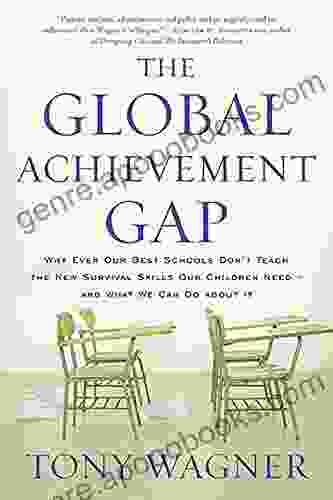Why Our Kids Don't Have the Skills They Need: Education Failure in America

In an era marked by rapid technological advancements and globalization, the acquisition of essential skills has become paramount for our children's success. College, careers, and active participation in society all demand a solid foundation in critical thinking, problem-solving, communication, collaboration, and digital literacy.
However, a growing concern has emerged in the United States: our students are falling behind in these crucial areas. Despite substantial investments in education, American students consistently underperform their peers in other developed countries on international assessments.
4.5 out of 5
| Language | : | English |
| File size | : | 1987 KB |
| Text-to-Speech | : | Enabled |
| Enhanced typesetting | : | Enabled |
| Word Wise | : | Enabled |
| Screen Reader | : | Supported |
| Print length | : | 362 pages |
This alarming trend raises a fundamental question: why do our kids not have the skills they need? To answer this question, we must delve into the systemic issues, societal factors, and misguided educational practices that contribute to this educational failure.
Socioeconomic Disparities and Inadequate School Funding
One of the most significant factors influencing educational outcomes is socioeconomic status. Children from low-income families often attend schools with fewer resources, less experienced teachers, and overcrowded classrooms. These disadvantages translate into lower academic achievement and reduced access to extracurricular activities that develop essential skills.
Moreover, inadequate school funding exacerbates these disparities. Underfunded schools struggle to provide students with essential resources, such as textbooks, technology, and specialized programs. As a result, students from disadvantaged backgrounds face an uphill battle in acquiring the skills they need.
Misaligned Curricula and Overemphasis on Standardized Testing
The American educational system has become increasingly focused on standardized testing. While standardized tests can serve as a measure of student achievement, they often lead to a narrowing of the curriculum and a shift away from teaching critical thinking and problem-solving skills.
Instead, students are forced to memorize facts and regurgitate information to pass standardized tests. This test-driven approach undermines the development of higher-Free Download thinking skills, creativity, and the ability to apply knowledge in practical situations.
Technology Gap and Lack of Digital Literacy
In the digital age, digital literacy has become an essential skill. However, there is a wide technology gap between students from different socioeconomic backgrounds. Students from affluent families have greater access to computers, smartphones, and other devices, while students from disadvantaged backgrounds may not have reliable internet access or up-to-date technology.
This digital divide limits students' ability to engage in online learning, participate in collaborative projects, and explore digital resources. As a result, they fall behind in developing the digital literacy skills needed for college, careers, and civic engagement.
Lack of Experiential Learning and Real-World Applications
Traditional educational approaches often emphasize abstract learning and theoretical knowledge. While these concepts are important, they need to be complemented with experiential learning opportunities that allow students to apply their knowledge to real-world situations.
Internships, apprenticeships, and project-based learning can provide students with valuable hands-on experience. By engaging in these activities, students develop problem-solving, decision-making, and communication skills that are essential for college, careers, and civic participation.
Addressing the Skills Gap
The alarming decline in our children's essential skills demands immediate action. To address this critical issue, a comprehensive approach is needed that involves systemic reforms, societal investments, and innovative educational practices.
1. Invest in Early Childhood Education: Research has shown that high-quality early childhood education can level the playing field for students from disadvantaged backgrounds. By investing in pre-K and kindergarten programs, we can provide children with a solid foundation for future success.
2. Increase School Funding: Adequate funding is essential to provide all students with the resources they need to succeed. By increasing school funding, we can reduce class sizes, attract experienced teachers, and provide access to essential programs and technologies.
3. Rethink Standardized Testing: While standardized tests can be useful for measuring certain aspects of student achievement, they should not drive the entire educational system. We need to shift the focus towards formative assessments and authentic measures of student learning.
4. Prioritize Experiential Learning: Educators should incorporate more experiential learning opportunities into the curriculum. Internships, apprenticeships, project-based learning, and service-learning can help students develop essential skills in a real-world context.
5. Bridge the Technology Gap: Schools need to provide all students with access to technology and digital resources. This includes providing devices, Wi-Fi access, and training on digital literacy skills.
6. Foster Collaboration and Partnerships: Schools and communities need to work together to support students' skill development. Partnerships with local businesses, community organizations, and higher education institutions can provide students with valuable experiences and mentorship opportunities.
The skills gap is a pressing issue that threatens the future of our children and the competitiveness of our nation. By addressing the systemic issues, societal factors, and misguided educational practices that contribute to this problem, we can empower our children with the skills they need for college, careers, and responsible citizenship.
Let us work together to create an educational system that provides all students with the opportunity to succeed and reach their full potential.
4.5 out of 5
| Language | : | English |
| File size | : | 1987 KB |
| Text-to-Speech | : | Enabled |
| Enhanced typesetting | : | Enabled |
| Word Wise | : | Enabled |
| Screen Reader | : | Supported |
| Print length | : | 362 pages |
Do you want to contribute by writing guest posts on this blog?
Please contact us and send us a resume of previous articles that you have written.
 Book
Book Novel
Novel Page
Page Chapter
Chapter Text
Text Story
Story Genre
Genre Reader
Reader Library
Library Paperback
Paperback E-book
E-book Magazine
Magazine Newspaper
Newspaper Paragraph
Paragraph Sentence
Sentence Bookmark
Bookmark Shelf
Shelf Glossary
Glossary Bibliography
Bibliography Foreword
Foreword Preface
Preface Synopsis
Synopsis Annotation
Annotation Footnote
Footnote Manuscript
Manuscript Scroll
Scroll Codex
Codex Tome
Tome Bestseller
Bestseller Classics
Classics Library card
Library card Narrative
Narrative Biography
Biography Autobiography
Autobiography Memoir
Memoir Reference
Reference Encyclopedia
Encyclopedia Susan Jean Ricci
Susan Jean Ricci Thomas Hehir
Thomas Hehir Patricia Haverton
Patricia Haverton Ml Nystrom
Ml Nystrom Nick Clausen
Nick Clausen Ruth Stiles Gannett
Ruth Stiles Gannett Susanne Lindgren Wofford
Susanne Lindgren Wofford Lee Zimmerman
Lee Zimmerman Kiiro Yumi
Kiiro Yumi Mc Jamass
Mc Jamass Robyn Cairns
Robyn Cairns Ruth Shilling
Ruth Shilling Michael Shellenberger
Michael Shellenberger Madeline Stitch
Madeline Stitch Richard H Schmidt
Richard H Schmidt Kimberly A Rogers
Kimberly A Rogers Mike Socarras
Mike Socarras Martha Gabler
Martha Gabler Pero Vaz De Caminha
Pero Vaz De Caminha Meghan Davis
Meghan Davis
Light bulbAdvertise smarter! Our strategic ad space ensures maximum exposure. Reserve your spot today!

 Matthew WardEmbrace the Eerie: Delve into the Supernatural Depths of 'The Monkey's Paw'...
Matthew WardEmbrace the Eerie: Delve into the Supernatural Depths of 'The Monkey's Paw'... J.D. SalingerFollow ·3.6k
J.D. SalingerFollow ·3.6k Caleb LongFollow ·14.4k
Caleb LongFollow ·14.4k Harvey BellFollow ·19.4k
Harvey BellFollow ·19.4k Roger TurnerFollow ·2.5k
Roger TurnerFollow ·2.5k Jorge AmadoFollow ·8.7k
Jorge AmadoFollow ·8.7k Martin CoxFollow ·18.6k
Martin CoxFollow ·18.6k James JoyceFollow ·5.8k
James JoyceFollow ·5.8k Roy BellFollow ·11.3k
Roy BellFollow ·11.3k

 Finn Cox
Finn CoxCarmen Suite For Flute Quartet (G Alto Flute) ( Carmen...
Experience the Magic of...

 Andy Cole
Andy ColeUncover Hidden Truths: A Comprehensive Guide to Detecting...
: The Silent...

 Ken Simmons
Ken SimmonsUnleash Your Potential: Transform Frustration and...
Are you tired of feeling...

 Rick Nelson
Rick NelsonHard To Kill: A Gripping Thriller That Will Keep You on...
Tom Rollins is a...

 Ivan Turner
Ivan TurnerUnleash the Power of Your Breath: Discover Breath...
In the tapestry of life, where stress and...
4.5 out of 5
| Language | : | English |
| File size | : | 1987 KB |
| Text-to-Speech | : | Enabled |
| Enhanced typesetting | : | Enabled |
| Word Wise | : | Enabled |
| Screen Reader | : | Supported |
| Print length | : | 362 pages |












